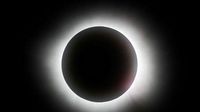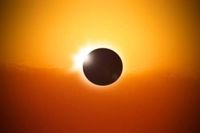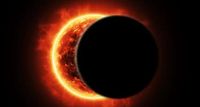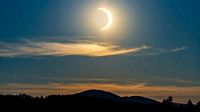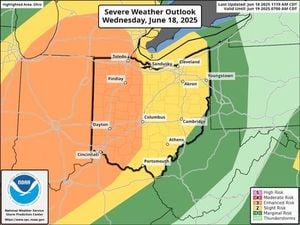On March 29, 2025, a partial solar eclipse will take place, captivating sky watchers across various regions, including Spain. Following a recent total lunar eclipse on March 14 that showcased a "Blood Moon," this upcoming event marks another significant moment in the astronomical calendar.
A solar eclipse occurs when the Moon passes directly between the Earth and Sun, blocking the sunlight partially or entirely. Astronomers describe the beauty and spectacle of eclipses, as they create stunning visual effects that have fascinated humans for centuries. As NASA explains, "The partial solar eclipse will begin at 15:57 (UTC) and end at 17:47." Timing is essential for viewing, with the maximum obscuration of the Sun expected at 10:47 (UTC), at which point "0.93 of the diameter of the Sun will be obscured." This event will be visible in regions of North America, Europe, and Africa, making it an international spectacle.
In Spain, the partial eclipse will be particularly notable in the northwest provinces, with exciting projections for solar coverage. In cities like Madrid, the eclipse will start around 10:48 hours, peak at 11:40 hours, and conclude by 12:33. This peak will reveal a magnitude of 0.32, according to the Observatorio Astronómico Nacional. Other cities will experience varying intensities as well: in A Coruña, the coverage will reach up to 0.43 magnitude, whereas areas in the south like Ceuta will see less at approximately 27.7% coverage.
For those unable to witness the eclipse in person, NASA and other platforms will provide live streams, allowing enthusiasts to enjoy this cosmic event safely from their homes. As experts remind us, any direct viewing of the sun, especially during an eclipse, should be done with appropriate protective eyewear, not regular sunglasses. "No should look directly at the sun during the solar eclipse without proper protection," stresses safety guidelines.
This partial solar eclipse will be the first of several remarkable celestial events for Spain in the coming years. Following the March event, a total solar eclipse will occur on August 12, 2026. It's anticipated to be particularly special; it will be the first total eclipse visible in Spain in over a century. The path of totality will sweep across key cities, presenting a once-in-a-lifetime opportunity for residents to experience this grand spectacle.
The excitement does not end there; another total solar eclipse will be visible from southern Spain on August 2, 2027, followed by an annular eclipse on January 26, 2028. Each of these events provides incredible opportunities for education and engagement with astronomy, as they draw attention to the wonders of our solar system.
Astrophysics enthusiasts know these eclipses to be rare and beautiful events that not only invite public observation but also scientific study. They are moments where natural phenomena harness social gatherings and educational engagement, forming a bridge between generations as families gather to share in the anticipation and wonder.
The upcoming partial solar eclipse promises to be an inspiring event, giving observers a glimpse of how celestial bodies interact in our universe. Whether you're viewing live in the sky or watching online, this is a date marked for astronomy lovers and curious minds alike.
